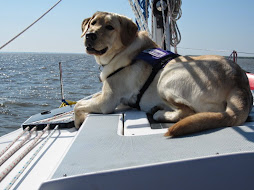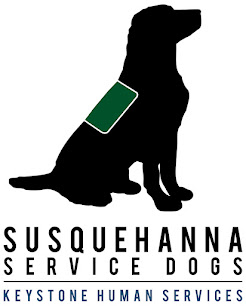This February, seven people received their new service dogs.
Each person was specially matched with their service dog to make sure they’ll
be a good fit.
The first time a person meets their new service dog is at
Meet the Dogs. At that time, they don’t know which dog will ultimately become
theirs. However, the matching process starts long before a person meets a dog.
When we have a group of dogs in advanced training who are
ready to begin the matching process, our trainers sit down and discuss what
jobs each dog is best suited for and what type of person they would match best
with. Not only have we been watching the dogs since they’ve been born, but our
trainers have spent at least two months working closely with the dogs in
advanced training. Each dog has strengths and weaknesses that make them better
suited for different jobs. Once we figure out what kind of job a dog could do,
we look at the waiting list to see who might be a potential match.
Our waiting list is 1-3 years long, depending on the dogs we
have available. We begin with people who have applied for successor dogs and
then look at the people who have been on our waiting list the longest. At this
point, we look at many different things.
We look at the person’s home environment to make sure the
dog’s energy level fits the physical environment they would live in. For
example, we wouldn’t want to place a high energy dog with someone who lives in
a small apartment.
We also look at the person’s lifestyle. Do they travel a
lot? Their dog would need to be comfortable flying or taking long road trips.
Do they work in an office? The person may need a dog who’s happy spending most
of the day sleeping. Are they always on the go? The dog would need to be more
active and comfortable with continually changing environments. Does the person
spend time in the hospital? The dog would need to be able to handle a hospital
environment or be able to handle the stress of being temporarily separated from
their person.
We also look at whether the dog gets along with other
animals and if they’re good with children.
One of the most important things we look at is the tasks a
person needs the dog to perform. We want to make sure the dog wants to do that
type of work. When a dog enjoys the work they’re doing and their partner knows
they enjoy it, then the team can really bond, and we know the team will be
successful.
All of these—and more—are factors we consider when
determining if a dog and person are a potential match. If we think we have a
potential match or matches, we invite the person to Meet the Dogs.
During Meet the Dogs, the person comes to our Susquehanna
Service Dogs Complex and actually meets the dogs. The person works with one dog
at a time. We bring in one dog and let them interact. Then we ask the person to
ask the dog to do some basic obedience cues, such as “sit.”
The whole time, we watch the person and the dog. We know
that the person picks the dog and the dog picks the person. Does the dog want
to stay with the person? Were they eager to work for that person? Or do they
wander away when left to their own choice? Is the person comfortable with the
dog? Or do they tense up when the dog comes near?
After meeting each dog, we ask the person to tell us what
they liked and didn’t like about the dog, and then we have them rank the dogs.
Based on all of this information and everything we’ve observed, we match the
person with a service dog. There’s science behind each match, although
sometimes it comes down to a gut feeling that a person and dog will suit.
Once the match is made, we start training each dog
specifically for their partner. We’ll share more about how we train dogs for
their partners in a future post. If you haven’t read our last post about the
new dogs who just entered advanced training, be sure to check it out! You’ll
read about our dogs in training before they start the matching process.










No comments:
Post a Comment